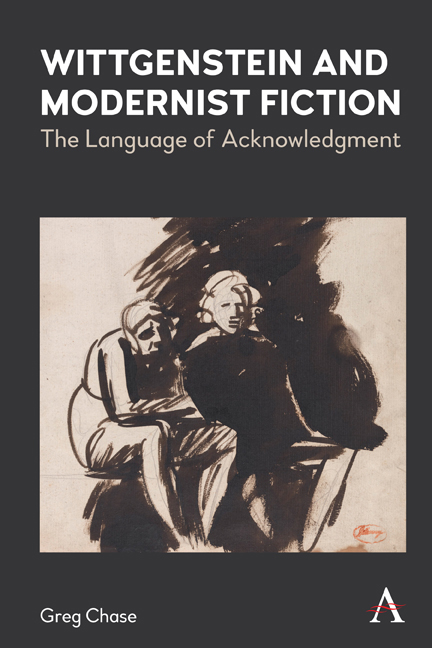Book contents
- Frontmatter
- Contents
- Acknowledgments
- List of Abbreviations
- Introduction: Modernist Philosophy and Modernist Fiction
- 1 “Who’s ‘We’?”: Claims to Community in Forster’s Howards End and Woolf ’s Mrs. Dalloway
- 2 “The Silent Soliloquy of Others”: Wittgenstein’s Pursuit of Acknowledgment
- 3 “To See with the Same Eyes”: Marriage and Same-Sex Intimacy in Ford, Woolf, and Larsen
- 4 Fragmenting Families, Private Language Fantasies: Faulkner’s The Sound and the Fury and As I Lay Dying
- 5 Seeing Humans as Humans: Wright’s Black Boy and Ellison’s Invisible Man
- Conclusion: Afterlives of Acknowledgment
- Notes
- Bibliography
- Index
1 - “Who’s ‘We’?”: Claims to Community in Forster’s Howards End and Woolf ’s Mrs. Dalloway
Published online by Cambridge University Press: 27 April 2022
- Frontmatter
- Contents
- Acknowledgments
- List of Abbreviations
- Introduction: Modernist Philosophy and Modernist Fiction
- 1 “Who’s ‘We’?”: Claims to Community in Forster’s Howards End and Woolf ’s Mrs. Dalloway
- 2 “The Silent Soliloquy of Others”: Wittgenstein’s Pursuit of Acknowledgment
- 3 “To See with the Same Eyes”: Marriage and Same-Sex Intimacy in Ford, Woolf, and Larsen
- 4 Fragmenting Families, Private Language Fantasies: Faulkner’s The Sound and the Fury and As I Lay Dying
- 5 Seeing Humans as Humans: Wright’s Black Boy and Ellison’s Invisible Man
- Conclusion: Afterlives of Acknowledgment
- Notes
- Bibliography
- Index
Summary
In February of 1901, about two weeks after the death of Queen Victoria, a 22-year-old King's College undergraduate named Edward Morgan Forster joined the Cambridge intellectual society known as the Apostles. Forster's admission into this club brought him into contact with many eventual affiliates of the Bloomsbury set: philosophers Bertrand Russell and G. E. Moore, economist John Maynard Keynes, and Leonard Woolf—best known today, of course, as husband to Virginia. Though Forster never read Moore's Principia Ethica (1903), nonetheless he shared the Bloomsbury group's dedication to the liberal values of “tolerance and enlightenment inaugurated in […] Moore's Cambridge.” In 1910, Forster established himself as one of the foremost English novelists of the age with Howards End, a work that signals his liberal sympathies, even as it criticizes the material realities that his society's liberalism has wrought.
The following year, 1911, another shy, uncertain young man entered this sphere of influence: Ludwig Wittgenstein. Wittgenstein had been studying engineering in Manchester but, having grown depressed, he traveled to Cambridge and showed up unannounced in Russell's rooms, wanting to discover whether he had any talent for philosophy. Like Forster's admission into the Apostles, Wittgenstein's sudden arrival in Cambridge proved a crucial turning point in his career. Under Russell's tutelage, Wittgenstein developed his early philosophy before the outbreak of the First World War prompted him to volunteer for the Austrian army. Upon the publication of his Tractatus Logico-Philosophicus (1922), Wittgenstein abandoned philosophy for several years, but he eventually returned to Cambridge in 1929 and spent much of the next two decades developing his mature philosophy of language, encapsulated in the posthumously published Philosophical Investigations (1953). Wittgenstein's work responds to the same historical circumstances that Forster, Virginia Woolf, and other modernists found disorienting. Like many works of literary modernism, his writings are permeated by anxieties about the fragmentation of human community, about the possibility that we may not be able to go on understanding or communicating with one another.
In the particular cases of Forster and Woolf, the resonances between their fiction and Wittgenstein's philosophy extend even farther. These three figures occupied a shared intellectual space; despite his more solitary nature, Wittgenstein moved in many of the same social circles as Forster and Woolf did.
- Type
- Chapter
- Information
- Wittgenstein and Modernist FictionThe Language of Acknowledgment, pp. 21 - 50Publisher: Anthem PressPrint publication year: 2022



